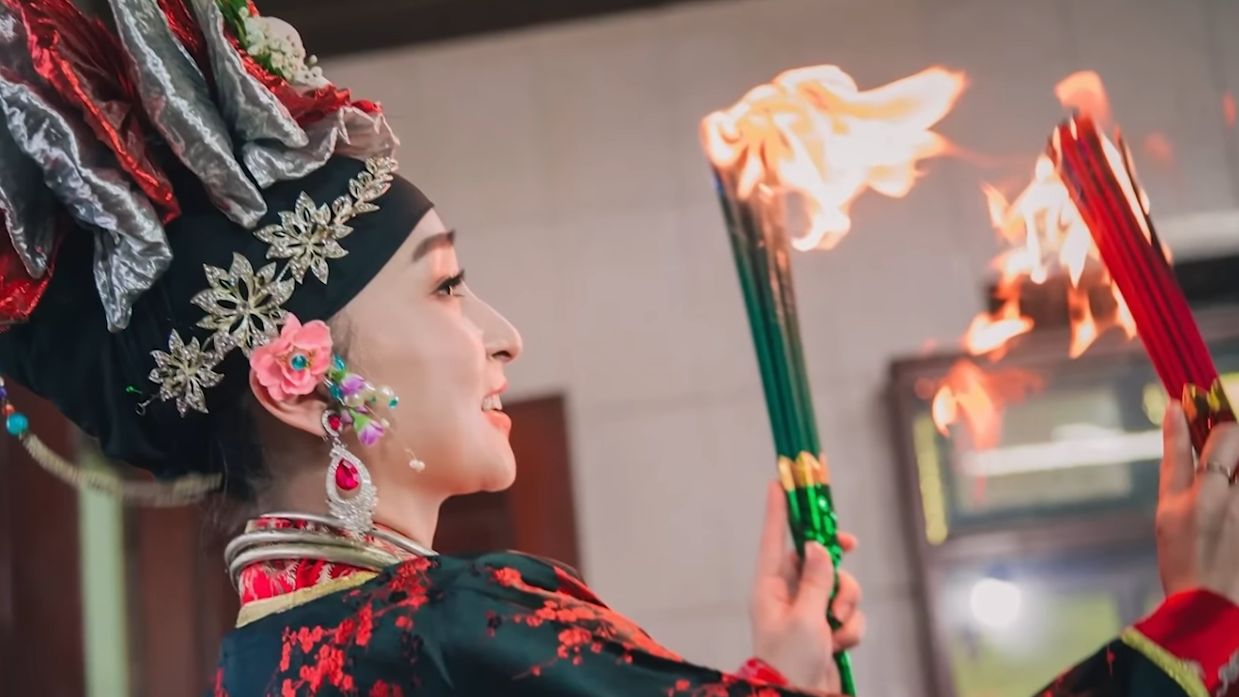The People's Police Newspaper reported that the amount of money embezzled could reach hundreds of millions of dong. This is just one of many scams that have occurred in recent years. The increasing number of such cases has led me to have a rather negative view of spirit possession. I believe many young people share this sentiment. However, spirit possession is a religious ritual recognized by UNESCO since 2016. So what is spirit possession that it can become an indispensable part of the spiritual culture of the Vietnamese during the Tet holiday? How can we protect and preserve this cultural beauty from distortion?
1. Origin:
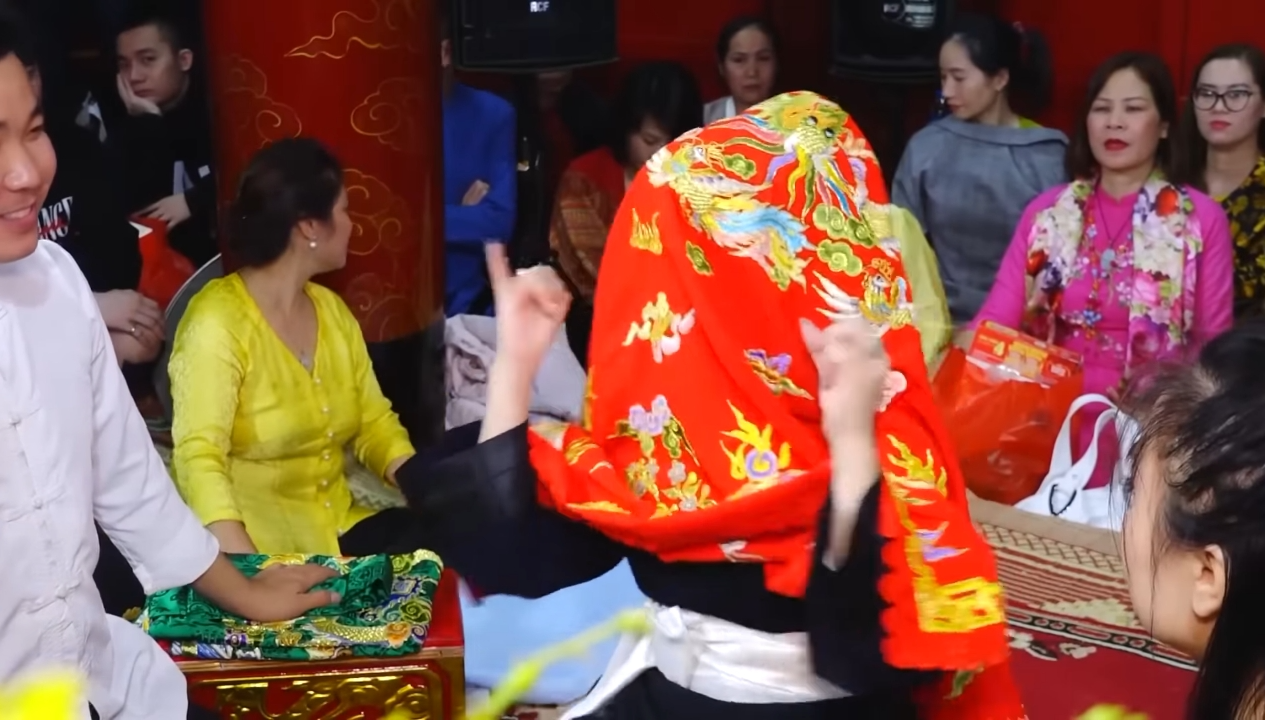
The origin and meaning of spirit possession is an important aspect of the religious rituals of many ethnic groups, including Vietnam. The essence of spirit possession is to call upon deities to enter the mediums to convey healing and blessings. According to the definition from Vietnamese Wikipedia, spirit possession is a ritual in the worship of the Mother Goddess in the Saman religion. According to the Government's Religious Affairs Committee, spirit possession is a ritual in the worship of the Mother Goddess of the Three Realms and the Four Realms of Saint Tran.
Note that spirit possession is not a ritual belonging to Buddhism. Currently, there are three Mother Goddesses being worshiped, including the Mother Goddess of Upper Goodness, the Mother Goddess of Upper Mountains, and the Mother Goddess of Water. Each Mother Goddess worshiped will have its own spirit possession ceremony with different characteristics such as costume colors and altar arrangements.
The spirit possession ceremony usually takes place in a special space called the medium's house, with three important elements that need to be prepared. First is the medium, those who have a connection with the deities and are chosen to convey the divine messages to mortals. Usually, these individuals have a hereditary connection from their family or have a weak nervous system.
The spirit possession ceremony is often accompanied by activities such as singing rituals, chanting, storytelling about the deities and spirits. Folk instruments such as the moon lute, two-stringed fiddle, large drums, and small drums are often used to create a sacred atmosphere for the ceremony.
Depending on the region, organizing a spirit possession ceremony requires careful preparation, especially regarding offerings. According to research, offerings are often designed simply, consisting of common offerings such as sticky rice, meat, fruits, betel leaves, and gold paper. However, in today's era, offerings have become increasingly rich and diverse, presented on a rectangular altar with items such as silver bowls and crystal plates.
2. Offerings:
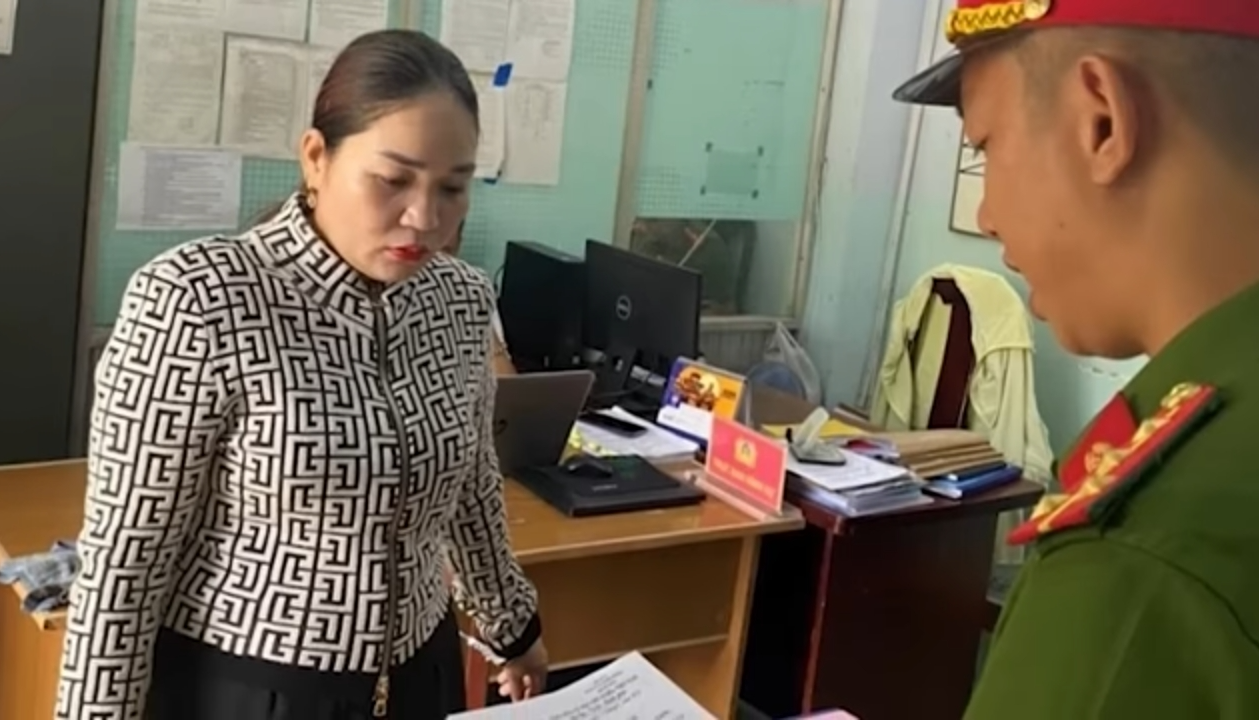
The altar will be arranged on a mirror covered with an embroidered cloth, including four trays of offerings with nine eggs, a comb, a fan, a sword, nine square pieces of cloth, a small cup, a small basin, and a tray of Son Trang shoes with embroidered phoenix designs. Additionally, in front of the altar, various types of gold paper and two wide boats shaped like phoenix wings with 12 figures rowing, a pair of horses, and a pair of elephants fully equipped with saddles and bits are displayed.
What is the purpose of organizing such a complex spirit possession ceremony? Theoretically, anyone can participate in spirit possession, but mainly those who have a connection with the deities. However, if one does not present themselves to the deities, they will face many difficulties, affecting their health, career, and fortune. Additionally, many people also participate in spirit possession with the hope of good luck and prosperity for the new year.
Organizing the spirit possession ceremony also reflects the patriotic tradition of the Vietnamese, honoring the deities who contributed to creating a peaceful life. However, in reality, the demand for organizing spirit possession ceremonies is increasing, but the purpose and meaning of the ceremony are often distorted, shifting towards more personal goals. Therefore, the traditional customs that were once a cultural beauty have been distorted.
Frankly speaking, organizing the spirit possession ceremony entirely belongs to the spiritual realm, with the main goal of bringing peace to the spirits of those who seek it. However, due to its spiritual nature, this activity can easily be abused, becoming superstitious. According to the Law Library, to avoid this, spirit possession ceremonies must adhere to certain principles, including being held only at places of worship, not being exploited for profit, and not spreading false or superstitious information.
A typical example of the distortion of spirit possession activities is the scam by Nguyen Thi Lieu, who exploited the desire for children of an infertile person. Instead of seeking scientific solutions, Lieu used tricks to threaten the family by saying they needed to hold a spirit possession ceremony to pray for the deceased. As a result, the victim's family was deceived into gathering all their savings, amounting to over 320 million dong, to organize the spirit possession ceremony.
Moreover, although the spirit possession ceremony is solely for the purpose of seeking peace, many other distorted activities still exist, such as exorcism, healing, fortune-telling, or casting harmful spells. All these activities are not the main objectives of the spirit possession ceremony.
3. Activities:
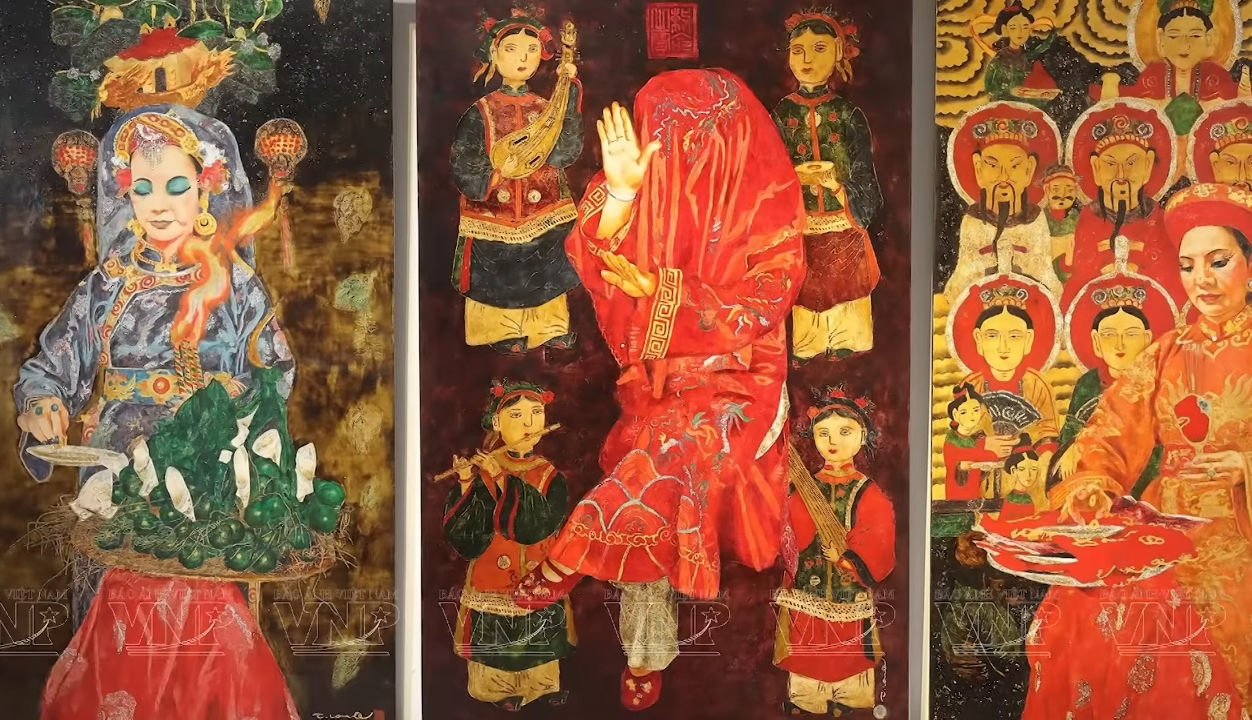
Despite the government's efforts to warn about these distorted activities, the phenomenon continues to exist as many people do not fully understand the true meaning of spirit possession. At the same time, spending money on these activities continues to increase, as some believe that the higher the price, the more effective or spiritual it is.
Thus, during the spirit possession ceremony, the scene of people rushing to pick up fallen offerings on the floor has become common. Even a 70-year-old elderly person tries to lean on a cane to have a chance to pick up a lucky money note. Due to the excessive crowd, the family of the medium has to send people to guard and prevent anyone from entering the spirit possession area, fearing chaos. However, those who spend money in this way are not wrong, as they do not violate any legal regulations, according to researcher Bui Trong Hien from the Vietnam Institute of Culture and Arts. In today's era, with the enormous wealth of some individuals, spending a small amount of money for each spirit possession ceremony is not unusual; it is just a naive belief.
Nevertheless, it is not that the government has no measures to handle this; there are both fines and criminal liability depending on the level of violation. However, the most important thing is the awareness and understanding of those who seek spirit possession and spiritual rituals in general.
Hopefully, through this article, everyone has understood the spirit possession ritual and its true meaning. From this understanding, let us be alert and utilize spirituality to live positively and find healing for our spirits.
Spirit possession, one of the traditional spiritual rituals of the Vietnamese, has long caused curiosity and controversy in the community. Some view it as an indispensable part of national culture, a meeting place between the divine world and the mortal world. However, there are also opinions that spirit possession is merely a form of superstition, losing measurement and science. In this article, we will explore deeper into the characteristics, meanings, and controversies surrounding the spirit possession ritual.
4. Forms and Meanings of Spirit Possession:
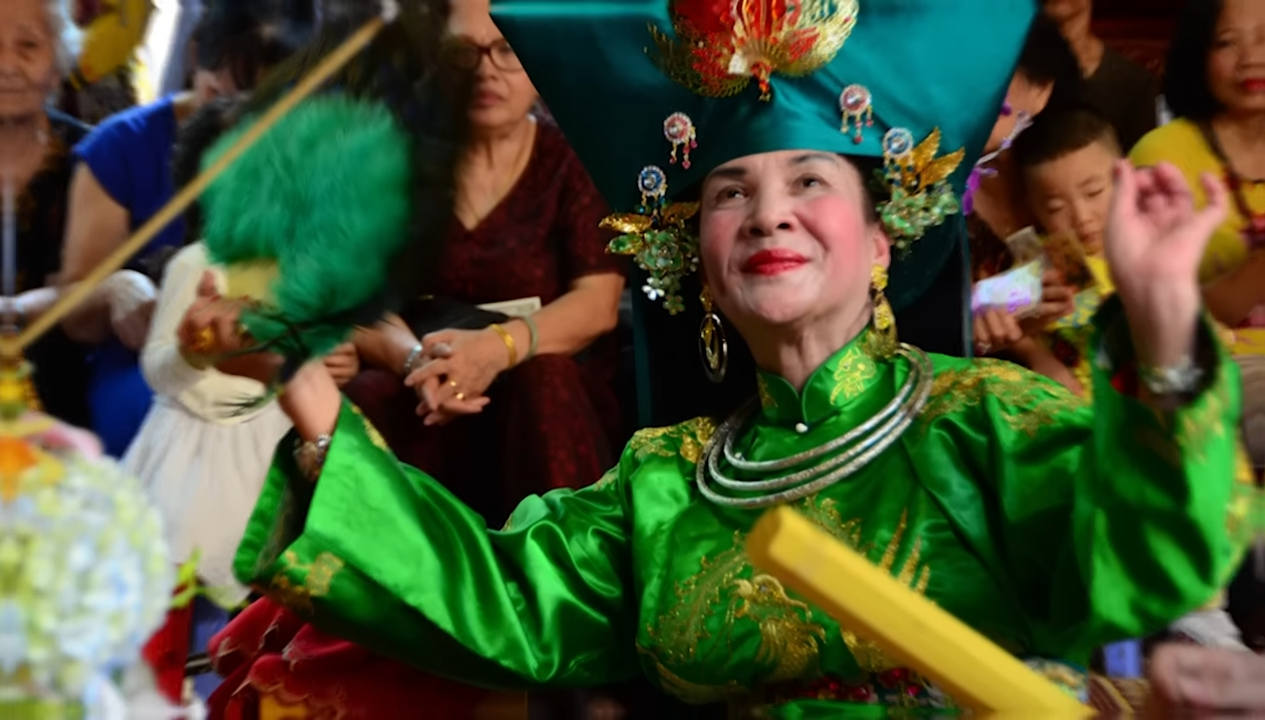
Spirit possession, also known as the face ceremony, is a popular religious ritual in the spiritual life of the Vietnamese. In this ceremony, a person regarded as a medium performs the act of "entering the spirit," meaning allowing deities to enter their body. At that time, the medium will express the will of the deities, from reassuring participants to bestowing blessings on families and communities.
The meaning of spirit possession is to seek peace and safety for everyone in society. It is also an occasion to remember and pray for the deities, ancestors, and lost souls. At the same time, the spirit possession ceremony is also an opportunity to connect people with the divine world, creating a sacred space filled with spirituality.
Although it has profound significance in national culture, spirit possession still faces many controversies and criticisms from society. Some people argue that spirit possession is a form of superstition, lacking scientific and rational basis. They believe that those who participate in spirit possession are lost in superstition and influenced by irrational beliefs. At the same time, spending money on spirit possession ceremonies is also criticized as wasteful and ineffective.
Meanwhile, supporters of spirit possession argue that it brings comfort and spiritual belief to participants. Spirit possession is not only a traditional ritual but also an indispensable part of the spiritual life of the Vietnamese. They believe that through spirit possession ceremonies, people can find peace and faith within themselves.
Spirit Possession in the Context of Modern Society
In the context of modern society, many people have raised questions about the role and meaning of spirit possession. With the development of science and technology, many young people have become skeptical and hesitant about traditional rituals like spirit possession. They adapt to a modern living environment where everything is measured and explained scientifically.
However, for those who still firmly believe in spirit possession, they see it as an indispensable part of spiritual life and national culture. Spirit possession not only creates a connection between the divine world and the mortal world but also provides an opportunity to remember and honor the deities and ancestors who contributed to building and protecting the nation.
Conclusion
In a culturally diverse society like Vietnam, spirit possession continues to play an important role in spiritual and cultural life. Although criticized as superstition, spirit possession still brings faith, hope, and connection to the spiritual world for many people. In the context of modern society, understanding and respecting traditional cultural values is essential for the preservation and sustainable development of the community.
